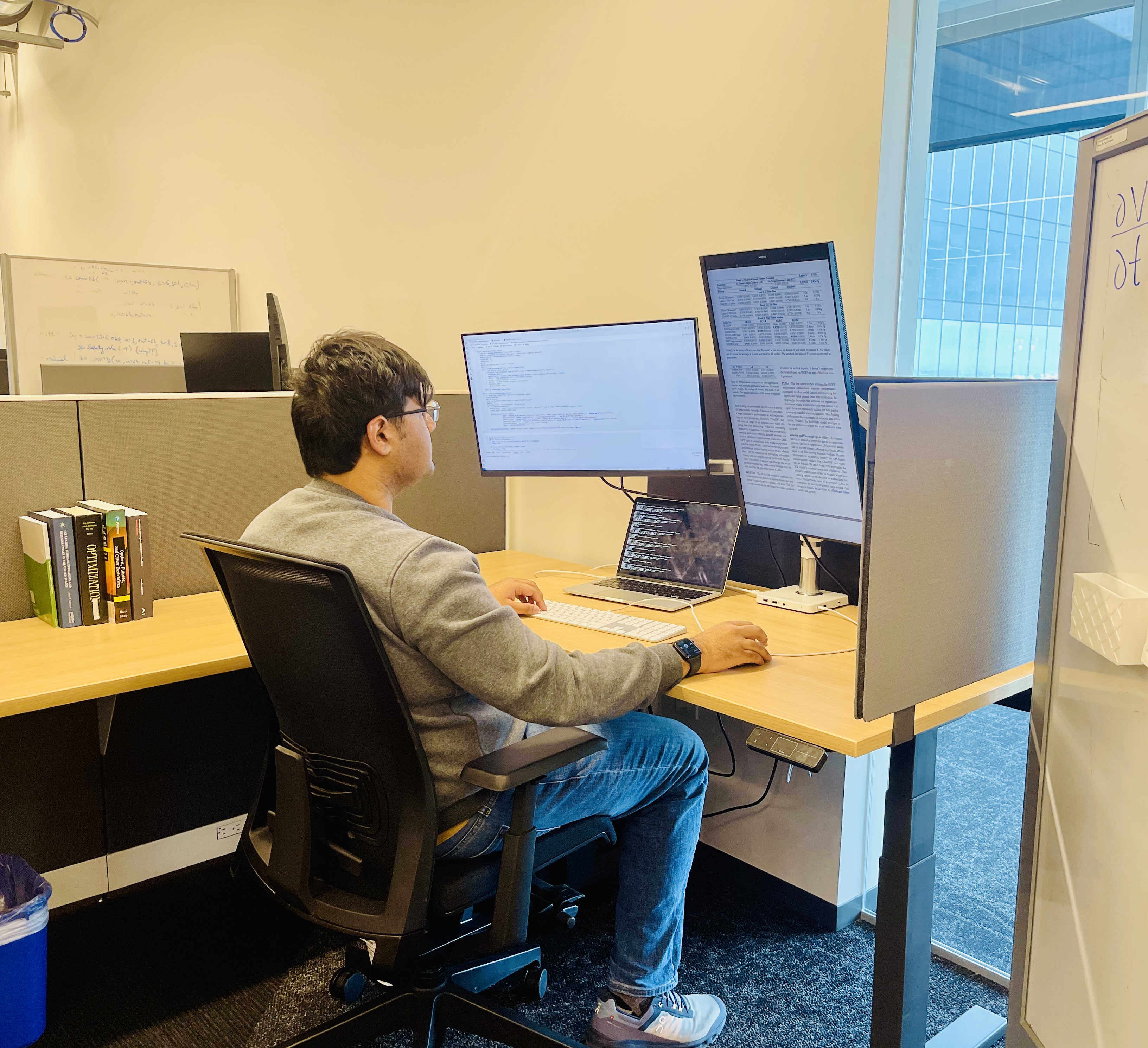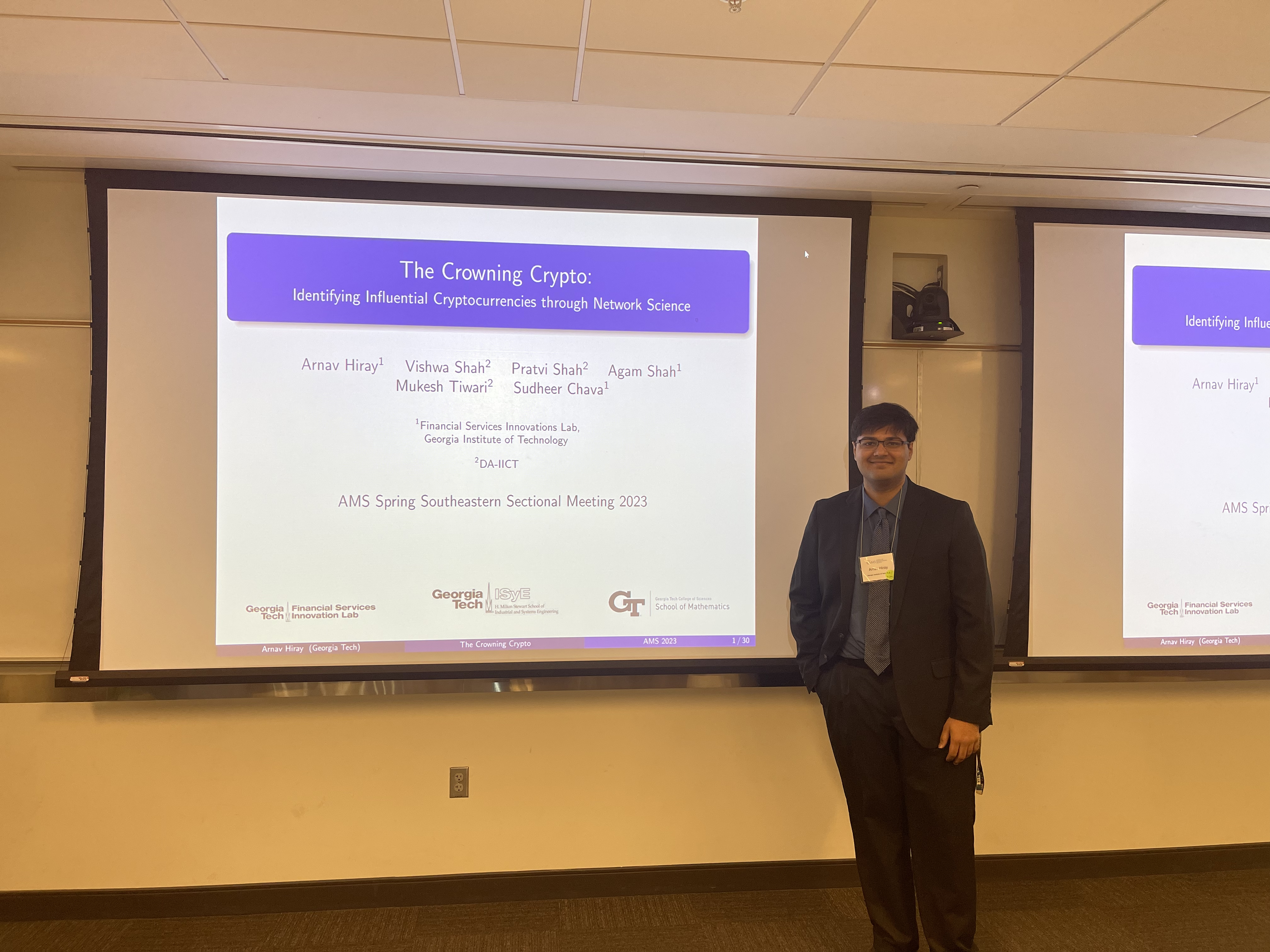Arnav Hiray is a 3rd-year double major in Industrial Engineering and Mathematics studying Applications of Mathematics and Machine Learning in Finance with Dr. Sudheer Chava.

How long have you been an undergraduate researcher at Georgia Tech?
I joined the Financial Services Innovations Lab (FSIL) during my first year, in Fall 2021.
How did you get involved with undergraduate research?
In high school, my involvement in debate and participation in the International Baccalaureate program introduced me to the importance of research fundamentals and fostered my ability to think creatively. Along with this, my interest in the intersection of finance and applied mathematics grew through personal projects and writing exploratory short papers. It became clearer to me that I was interested in pursuing research and thus wanted to explore research opportunities at Georgia Tech upon enrolling.
I began by exploring the research areas of different faculty members. Initially, I found the process challenging due to my limited understanding of the technical aspects of much faculty research. However, I began reading papers from relevant faculty with a specific focus on understanding the main idea and motivation behind each research project, avoiding getting caught up in the underlying proofs and methodology complexities.
After reading several intriguing papers published by FSIL, I eagerly applied to join the lab, expressing my interest in the lab’s research areas and vision. I was given the opportunity to join the lab and begin working on a project my freshman year in Fall 2021. Last Fall, I was one of few undergraduates recognized as a "Fintech Fellow” by the Financial Services Innovations Lab for my research contribution and active engagement within the lab.

What are you working on?
In the last three years, I have worked on a few different projects. During the first few semesters in the lab, I focused on investigating the underlying structure of Bitcoin transactions using network science. This involved modeling the flow of Bitcoin as a network of Bitcoin vendors/users, etc., and analyzing interactions between Bitcoin holders to understand how transaction-level properties can impact the cryptocurrency space.
This work later motivated me to explore the correlations in price movement regarding various cryptocurrencies in the overall cryptocurrency market. I presented my preliminary work, titled “The Crowning Crypto: Examining the Evolution of Cryptocurrency and Community Structures through Network Science” at the 2023 American Mathematical Society Spring Southeastern Sectional Meeting, among other conferences. Additionally, at the 2023 Spring Undergraduate Research Symposium, I presented my work and received 1st Place in the Oral Presentation category for the Scheller College of Business.
More recently, I have contributed to projects that apply natural language processing (NLP) techniques to better understand financial markets. One such project involves developing a method for numerical claim detection (identifying and extracting quantitative statements) within analyst reports (documents produced by financial analysts summarizing the performance and prospects of a company) and earnings calls (live conference calls or webcasts in which a company's management discusses its financial results with analysts, investors, and the media).
With evidence showing that retail investors significantly respond to information from such reports, it becomes apparent that understanding the quantitative claims made within these reports is paramount.
What is your favorite thing about research/researching?
I find research to be the most fascinating aspect of my journey at Georgia Tech so far. Undoubtedly, my interest in research was nurtured by the guidance and mentorship of Dr. Chava and Agam Shah, along with other members of the lab. Furthermore, the opportunity to explore important questions fuels my curiosity and excitement about my work. It also provides an excellent opportunity for me to apply what I have learned from my classes to real-life, fascinating problems. As you delve into a challenging yet fascinating problem, you may find that you are discovering more questions than answers - that's how you know you're in the right spot. This continuous exploration of impactful ideas is what keeps me genuinely interested as a researcher.

What are your future plans and how has research influenced them?
The enriching experience I've gained through research at Tech has made me committed to continue academic exploration beyond undergraduate studies. After completing my undergraduate degree, I aspire to pursue a PhD focused on research in the mathematical sciences and finance.
I wish to further explore problems in probability, optimization, and statistics, utilizing them to better understand financial markets and address significant issues affecting various stakeholders, from banks to retail investors. By applying these methodologies in practical settings, I aim to deepen my understanding of financial markets and their broader impacts. However, more recently, I have also developed an interest in the more theoretical side of mathematical science as well. This includes creating efficient optimization methods and developing new statistical methods to better understand networks. By exploring both theoretical and practical aspects, I aim to deepen my understanding of financial markets and their broader impacts, while also contributing to the advancement of mathematical theory.
